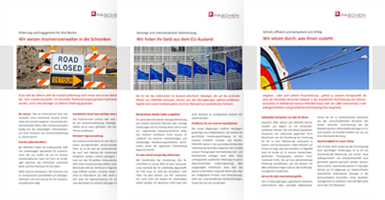Latest News / Entry
Contestation of insolvency and factoring – New BGH ruling
An important factual characteristic of almost all instances of contestation in insolvency proceedings is the creditor’s knowledge of the insolvency of the debtor. Whether this was available at the time of the payment to the creditor regularly forms a central topic of discussion with contesting insolvency administrators. Whether and, if so, under what conditions a creditor must allow the knowledge of third parties to be attributed, has now been the subject of a decision of the Federal Court of Justice IX. Zivilsenats des BGH vom 25. Mai 2023 – IX ZR 116/21.
The decided case concerned a dispute against a factoring company. While the insolvency administrator had not accused it of having been aware of the bankrupt financial situation of the debtor itself, it believed that the fact that its customer was aware of the financial distress of the later insolvency debtor must be attributed to the factor. The customer had induced the debtor, who was overdue with payment, to pay with the emphatic reference to imminent disadvantages, and subsequently obviously had knowledge of the debtor’s financial problems. The Court of Appeal had followed this and had ordered the factor, which had won the trial in the first instance, to pay.
The Federal Court of Justice reversed this decision and followed the first-instance decision of the regional court. While it is true that an attribution of knowledge is possible in principle if “the holder of knowledge, according to the work organisation of the business owner, is called upon to perform certain tasks under its own responsibility in legal transactions as its (i.e., the owner’s) representative and to take note of the resulting information”, this requires more than one provision in the factoring contract, according to which the subsequent customer must support the factor in enforcing claims against customers and communicate information about the insolvency of a customer.
This is no more than a (statutory) ancillary obligation of the claim seller under § 402 BGB, which is intended to facilitate enforcement of the claim by the factor (itself) as the purchaser, the violation of which merely entails a claim for damages against the seller. In contrast to the support of the factor in the collection of receivables by a service provider representing it, the subsequent customer is not integrated into the organisation in the sense that it becomes active for the factor. Although, in principle, the subsequent customer could also act for the factor without an order, i.e., as it were, on their own initiative, they must then at least have known about it and expressed their approval. However, the insolvency administrator had not demonstrated or proven any corresponding evidence.
Moreover, the fact that the factor itself had not taken immediate action was by no means sufficient to indicate that it had relied on the corresponding activities of its customer. It can rather be assumed that such activities are regularly performed by the subsequent customer, above all to avert negative consequences for its own business, in particular due to a concern that the exhaustion of debtor limits would hinder the purchase of further receivables and thus endanger its own liquidity.
The decision is of considerable importance for the classification of contestation risks in factoring. Although the affected factor could breathe a sigh of relief following the decision in the case in question, caution should be exercised when generalising. If the insolvency administrator succeeds in proving that the efforts of the subsequent customer served the clear goal of supporting the collection of receivables by the factor, the risk of attribution of its (i.e., the factor’s) knowledge remains. Fortunately, however, a blanket attribution of knowledge by the courts was initially blocked.
Further information on the subject of contestation in insolvency:



